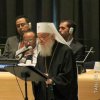Respected Sir President of the General Assembly of the Organization of United Nations, ladies and gentlemen, dear friends of humanity,
You have bestowed a great honor upon me by inviting me, as the spiritual head of the Serbian Orthodox Church, to speak about the culture of peace and about co-operation among nations, and to do so by addressing you who represent the nations of the world. And indeed, it is your task to take care about the well-being of all nations and every individual, and peace and harmony between people and nations are the first precondition of the well-being and future of humanity.
My pleasure is twofold since the invitation to speak at this highest world gathering was extended to me by Mr Vuk Jeremić, whom, ladies and gentlemen, you have elected to preside over the General Assembly of the Organization of United Nations and, thereby, through a democratic procedure, on a global level you have conferred another sign of high recognition to the resolve of the Serbian nation for peace as well as to the peaceful politics which are lead by the state of Serbia. I am most wholeheartedly thankful to Mr Jeremić and to all of you!
The usual biblical greeting exclaims: Peace be with you! It has become the traditional greeting of the three world monotheistic religions — Judaism, Christianity and Islam. Allow me to greet all of you with this ancient and sacred greeting, and thus to express my sincere respect:
Peace be with you! Shalom aleikhem! Εἰρήνη ὑμῖν! Selam aleikum!
In the liturgical service of the Orthodox Church this greeting is often heard in the widened form: Peace be to all! And from this honorable place it is this greeting that I extend — to all without exception, including those who have no peace, neither in themselves nor with themselves and therefore not being able to spread it among other people and nations. I also emphasize that before each of our liturgical services we Orthodox Christians ask God to grant us peace. It goes without saying that this firstly presupposes the inner, spiritual peace in the soul of each man and woman—the peace which transforms even the most bellicose human being into a peace-maker—and then, secondly, the “peace of the whole world”, the peace among peoples and states.
We believe in the God of peace and love, of goodness and forgiveness. This is why in Orthodox Christianity and in Christianity in general peace does not only signify the absence of war but, primarily, the presence of spiritual qualities — the acceptance and respect of others and of those who are different, of their freedom and dignity, of their God-given and natural right to all the good which we otherwise wish for ourselves as well. If we were to be inspired with such spirituality, then peace would be possible for the whole of humanity. Without such spirituality — war is unavoidable, even if the world is to be inhabited by only two human beings, even as two born brothers, like it once was with Cain and Abel. In this context I wish to stress that peace represents an ideal and non-belligerence a virtue in the value system of other great world religions and spiritual traditions as well.
Hence we do have the habit and we do feel the need to greet each other mutually with the call for peace. Lamentably, we do so mechanically, without thinking: we do not ponder upon the elevated meaning of this greeting, nor do we deliberate on the responsibility that should be presupposed by the use thereof.
During the past decades, especially in more recent times, we have not seen a speaker who could rejoice in the fact that, from this highly esteemed platform, he is addressing the political representatives of humanity in conditions of universal peace. Even today, while we speak about the culture of peace, we find that in some parts of the world the winds of war are raging and lesser and greater fires of war are lit. Today also force marches against law and justice, and the mask of altruism conceals selfish interests.
In view of our common failure to secure the rule of peace between individuals, people and states, has not the moment arrived in which we are called to seriously ask ourselves the following question: What is the true meaning of our usual exchange of the greeting of peace? Do we have the right to this noble greeting, so dear to the faithful of the major world religions and to all people of good faith? Is it not extremely hypocritical to profess and spread the beauty of faith in God and sublime spiritual teachings and also to elevate the dignity of the human person, and yet, at the same time, to submit to the unsustainability of peace and to the unavoidability of war between individuals, peoples and states? Do we have the will and the power to seriously and responsibly re-question our own conscience? Dare we reconcile ourselves with the fact that we have lost courage for truth and justice, as well as the capacity to give things their proper names?
In the name of the Serbian Orthodox Church, which I have the honor to here represent, and, I am convinced, also in the name of Christendom and all the sincerely believing people of this world, I beseech all of us to earnestly pray for peace in the world and that we all, sincerely and persistently, through common efforts, act so as to create the conditions which shall enable peace to prevail over war, and dialogue over the dictate of force. I believe that neither in this solemn hall nor in any other place on the planet there is to be found a human being or human community which would not agree to the mentioned appeal. Such a natural, principal and declarative agreement, however, is not sufficient in itself. On a daily basis this is convincingly demonstrated to us by the current of global processes and by the string of dramatic events on the international scene. In order to see the culture of peace in-rooted in the world, and this primarily means in human hearts and minds, we need to earnestly work on upbringing men and women for peace.
By the nature of their mission Churches and religious communities must engage in this in an organized and consistent way. In the name of the service of peace, reconciliation and the overcoming of conflicts, they have as their duty—precisely in the name of faith and in the name of spiritual and moral values—to co-operate sincerely. There is no doubt that to a certain degree they are doing so, of course, within the social space that is available to them. It is obvious, however, that their efforts so far remain insufficient. Even if they would have objective possibilities and sufficient will and élan for even more concerted action on the way to peace, not even that would be enough. For the Churches and religious communities cannot bring about the true overturn without the support and co-action of other agencies of social and historical processes. In conditions of isolation and especially in conditions of marginalization in certain societies, they are not capable to lead humanity toward the domains of universal peace, in which the greeting invocation of peace among people will not sound as empty and ring as a hollow echo of hypocritical cynicism and soulless pragmatism, which, alas, dominates international relations. Moreover, some Churches and religious communities were tempted to follow the logic of ideological one-sidedness and political power and that, in fact, is totally incompatible with their mission.
By the coincidence of historical and developmental circumstances, one part of the world—the smaller one, and for the time being the more influential one in terms of choice between peace and war—has for long been spared from greater armed conflicts. Most people who are fortunate to live in that part of the world imagine that the world is living in an era of peace, devoid from great wars in the world. This is a dangerous delusion. For the greater part and the more populated part of the world is simultaneously shaken by conflicts and wars which only seem to be remote, be it in terms of geography, or be it because they are happening to others. There cannot be any peace as long as it is a privilege of a small minority and, at the same time, the horrifying everyday reality or real threat for the majority of the inhabitants of our planet. If this is not understood in time, the ill-fated moment might befall us when there will be no peace for no one.
I come, and bring witness from, one of those unfortunate and by no means scarce parts of the world in which instability, conflicts and wars through history, including our times, were often the state in which one suffers, perishes and survives — but with which the individual man and woman as well as the nation can never make peace nor can they become accustomed to it. For the human being, before its fall into the abyss of sin and evil, was created to live in freedom and peace with his neighbors. Allow me, then, to share with you the experience of my Church and my people. This is a people who have encountered many misfortunes, a people who today in Kosovo—as its spiritual and state cradle—are deprived of life worthy of a human being, аnd, not seldom, of life itself. But, at the same time, this is a people who project their gaze and hope into the future, determined by all means to take part in the common world project of creating the presuppositions for just and lasting peace among people, nations and states.
Our common task has to be to make the peace of the world sustainable and lasting. Having in mind the lessons of the past and the trials of the present, this seems to be a remote goal, one difficult to achieve. But this is the only path which leads to the survival of mankind. The precondition which may allow us to commence drawing nearer to this remote goal is to have all of us, regardless of religious, ethnic, cultural and political affiliation and difference—each within the framework of his power, authority and duty: consistently and without the application of double standards— commit ourselves in the name of respect for the principle of equality and justness in international relations. For durability of peace is inseparable from its justness. I thereby presuppose a justness which each and everyone will feel as such and which shall not be imposed through partial, selective and tendentious “truths”, mediated and imposed by the use of force or through the powerful means of contemporary propaganda.
The culture of peace is incompatible with the cult of selfishness, with the practice of absolutization of egotistic interests. As a simple intellectual, axiological and moral foundation—albeit one difficult to attain—one which is the point of departure of all anthropologies, this culture presupposes the awareness that all people, before and above all differences, are given one common human nature and obliged through a sacred duty to improve it and to work on its further perfection. In the understanding of this certainty religion and science—and let us hope politics as well—are not and should not be in dispute. For our present and future time this is a promising point of departure in our common quest for the path which leads towards the overcoming of deep contradictions which today deprive the greeting peace be with you, shalom aleikhem, εἰρήνη ὑμῖν, selam aleikum of its essential dimension of existential truthfulness.
To build peace means not only to act within social-political frameworks. For it is an activity which is ontologically in the service of faith, hope and love — in the service of life and salvation.
Therefore, let us be peace-makers!
Thank you all for your patient and gracious attention!
Translated into English by Bogdan Lubardić






